Unitarian Universalist Congregation of Columbia
October 22, 2017
Rev. Jeff Liebmann
Opening Words
The Story of Nehemiah
About 50 years after Babylon conquered Judea and moved many Jewish leaders into exile, Babylon herself fell to the Persians under the leadership of Cyrus the Great. Judea remained a colony of Persia for two centuries until Alexander the Great swept through the Middle East in 332 BCE.
In 445 BCE (after nearly a century of Persian rule), King Artaxerxes noticed that one of his Jewish servants – Nehemiah – was sad. The King asked Nehemiah what troubled him.
Nehemiah had learned that the walls of Jerusalem were in ruins and its gates destroyed by fire. Nehemiah asked the king to send his to the city of his ancestors in order to rebuild it. The king named Nehemiah governor and provided letters ordering the leaders of Judea to provide whatever help Nehemiah needed.
But, the rich and powerful leaders in Jerusalem mocked Nehemiah, and questioned his authority. Nevertheless, Nehemiah set to work and soon the Jews were repairing the breaches in the wall and rebuilding the gates. Still the leaders resented Nehemiah’s efforts and threatened the workers, forcing them to stand watch over each other as they worked.
The Selfish Giant
Every afternoon, as they were coming from school, the children used to go and play in the Giant’s
 garden. The Giant had left years before to visit his giant relatives. It was a large lovely garden, with soft green grass. There were beautiful flowers peach trees that produced pink blossoms in the spring and delicious fruit in the fall. Birds sat on the trees and sang so sweetly that the children used to stop their games in order to listen to them.
garden. The Giant had left years before to visit his giant relatives. It was a large lovely garden, with soft green grass. There were beautiful flowers peach trees that produced pink blossoms in the spring and delicious fruit in the fall. Birds sat on the trees and sang so sweetly that the children used to stop their games in order to listen to them.One day the Giant came back and saw the children playing in the garden. “What are you doing here?” he growled, and the children ran away. The Giant decided to keep anyone but himself from playing in his garden, so he built high wall all round it, and put up a sign that read “KEEP OUT!”
Now, the children had now nowhere to play. They would wander round the high wall when their lessons were over, and talk about the beautiful garden inside. They remembered how happy they were playing in the garden.
When spring came, the country was filled with blossoms and birds…except in the garden of the Selfish Giant, where it was still winter. The birds did not want to sing in it as there were no children, and the trees forgot to blossom. Once a beautiful flower put its head out from the grass, but when it saw the KEEP OUT! Sign, it was so sorry for the children that it slipped back into the ground again.
“I cannot understand why the spring is so late in coming,” said the Selfish Giant, as he sat at the window and looked out at his cold and snowy garden. “I hope there will be a change in the weather soon.”
But the spring never came, nor the summer. Autumn gave golden fruit to every garden except the Giant’s. So it was always Winter there, and only the North Wind and the snow danced about through the trees.
One morning the sad Giant heard some lovely music. It sounded so sweet to his ears that he rushed out to see where the sound was coming from. It was a small bird sitting on a branch in a tree and the Giant thought, “Perhaps spring has come at last!”
But when he looked into his garden, he saw a hole in his wall. The children had crept in and they were playing everywhere. The trees were so glad to have the children back again that they had covered themselves with blossoms, and were waving their arms gently above the children’s heads. The birds were flying about and twittering with delight, and the flowers were looking up through the green grass and laughing.
And so the Giant took down his high wall and replaced the KEEP OUT! sign with one reading “Welcome!”
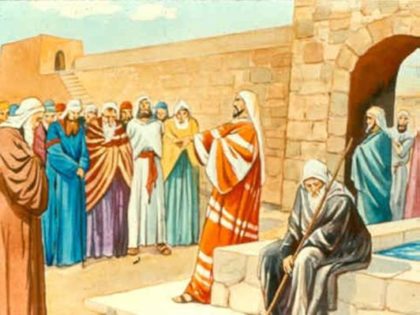 There was a great outcry by the common folk and the wives… “We must get grain in order to live!…We must pawn our fields, our vineyards and our homes to get grain to stave off hunger! We have borrowed money against our fields and vineyards to pay the king’s tax…we are as good as our brothers…yet here we are subjecting our sons and daughters to slavery…and we are powerless, while our fields and vineyards belong to others.”
There was a great outcry by the common folk and the wives… “We must get grain in order to live!…We must pawn our fields, our vineyards and our homes to get grain to stave off hunger! We have borrowed money against our fields and vineyards to pay the king’s tax…we are as good as our brothers…yet here we are subjecting our sons and daughters to slavery…and we are powerless, while our fields and vineyards belong to others.”[So, Nehemiah went to the rich and powerful and reproached them.] “Are you pressing claims on loans made to your brothers?” Then he raised a large crowd against them and said, “We have done our best to buy back our Jewish brothers who were sold to the nations; will you now sell your brothers so that they must be sold back to us?” They kept silent, for the found nothing to answer.
Nehemiah continued. “What you are doing is not right…let us now abandon those claims! Give back at once their fields, their vineyards, their olive trees, and their
homes, and abandon the claims for 100 pieces of silver, the grain, the wine, and the oil that you have been pressing against them!”
The rich and powerful agreed. Nehemiah then summoned the priests and put them under oath to keep their promise.
I moved to Pittsburgh when I was 10 years old. Behind our house, the property plummeted steeply down toward a creek formed largely by storm drain runoff. I spent many hours there building dams and doing all the things kids do with water, rocks, and sticks.
Then, I discovered a clay deposit a little ways down the creek. Now I had the ability to build stronger dams, walls, and towers for Matchbox cars and plastic people to negotiate.
The desire to build is learned early in the life of children in modern cultures. I imagine many of you
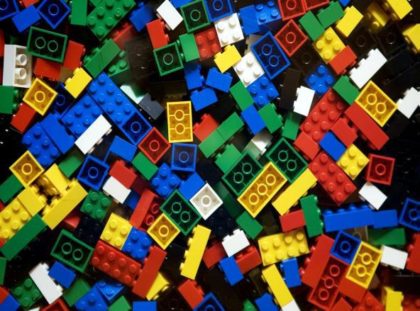 have built sand castles, digging moats to fight the inevitable tide. Whether simple blocks, Legos, Duplos, Megablox, or the more complicated K’nex, Erector Sets, or Lincoln Logs, we deluge our children with the tools of construction at an early age.
have built sand castles, digging moats to fight the inevitable tide. Whether simple blocks, Legos, Duplos, Megablox, or the more complicated K’nex, Erector Sets, or Lincoln Logs, we deluge our children with the tools of construction at an early age.I suppose this indoctrination makes sense. We separate ourselves with walls and fences. And even when no actual wall or fence exists, instilled in us all is a cultural understanding of space and division that creates a comfort zone. Unitarian folk singer Malvina Reynolds wrote about this phenomenon decades ago in her song “Little Boxes.” If I asked each of you to move your chairs a couple inches closer together so that your arms touched others’ on either side, many of you would feel uneasy. Perhaps even the suggestion stretches your comfort zone and I apologize for any anxiety the suggestion caused.
The personal space paradigm makes itself perhaps most obvious in men’s public restrooms. As I say this, I know that every one of you who has ever used a urinal knows what I am talking about. We don’t overtly teach bathroom etiquette, and yet we learn quickly the most acceptable ways to position ourselves in public spaces.
And so, walls play a very important physical and figurative role in our lives. Whether an old wall needs repair or a new wall comes under consideration, the act can reverberate in our history for centuries.
The long period of Jewish exile – first under the Babylonians, then under Persia – provided an important crucible molding the Hebrews and testing the mettle of their faith. In the early years, we got the Holiness Code outlined in the Book of Leviticus – a self-imposed and rigorous punishment for disobeying God’s commandments. Leviticus laid out a harsh collection of rules meant to bring the Jews back into compliance and to sustain their culture in a foreign land.
Sadly, too many people in modern times cull portions from Leviticus for their own purposes in order to persecute the “other” – people who are different from themselves. But citing rules written for the Jews in exile 2,500 years ago in today’s world ignores their historical and theological context. Quoting verses from Leviticus in isolation from other contents of the Hebrew Bible also ignores the far more prevalent message of the power of faith and the rewards of belief.
Now, we have all heard a lot of talk about a wall along the southern border of the United States over the past year. Setting aside the absurd cost of such an endeavor, we must find it distressing that anyone thinks such a literal wall serves any purpose except to divide humanity along false ideological definitions. Like the Maginot Line, which failed to protect the French from German invasion, no fixed structure will ever prevent people from entering our country from Mexico.
And so, we must ask ourselves “why?” If any thinking person acknowledges that an enhanced and expanded Mexican border wall serves no functional purpose, then why do people support the idea?
To a people in the midst of centuries of cultural crisis, repairing the breaches in the walls of Jerusalem signaled the need to re-establish traditions and culture. The wall protected Jews by shunning the “other” or those among the Jews who were not “good enough” Jews. The wall provided a real, as well as a symbolic barrier to the enemies of Judea wishing to take advantage of the Jews’ plight. Similarly, many so-called “white” people in America, facing their shrinking proportion as a percent of total population, may see the wall as a way to keep out perceived threats to their way of life.
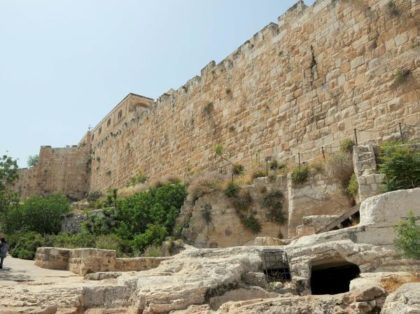 The argument lacks any logic, and we delude ourselves if we seek rationality among the wall’s supporters. In ancient time, a wall only barred access for a brief time, as cities such as Jerusalem were major hubs of economic and social activity. In a more modern and (hopefully) more enlightened time, no wall should be expected to literally shut out people who are different.
The argument lacks any logic, and we delude ourselves if we seek rationality among the wall’s supporters. In ancient time, a wall only barred access for a brief time, as cities such as Jerusalem were major hubs of economic and social activity. In a more modern and (hopefully) more enlightened time, no wall should be expected to literally shut out people who are different.For Nehemiah, the breaches in the wall represented failures of the people to sustain their faith and way of life. Repairing the breaches served a very real purpose of shielding the Jews from non-Jews. Repairing the wall surrounding Jerusalem was their response to more than a century of adversity; to attempts by larger and stronger cultures to assimilate the Jewish people and erase their identity.
According to Jay Neugeboren, an expert on the Books of Ezra and Nehemiah, modern Jews “may try to gloss over the literalness of the injunctions against mingling with the Gentiles and choose to interpret the text metaphorically.” But, Neugeboren claims that the text is unequivocal – for Jews to be true to their covenant with God, they must “guard against the slightest physical or moral union with those unlike themselves.”
The United States, however, can lay no claim to such an imperative. Americans include a hodgepodge of religions and beliefs. Quite the opposite of ancient Jews,
America owes its unique culture to the diversity of its people, the nonuniformity of its gene pool, and the respectful consideration of different ideologies and practices.
Does the story of Nehemiah and the wall, therefore, hold any relevance to us? I believe the message of this story for Unitarian Universalists lies not in the literal or figurative interpretation of the wall. Rather, the meaning for us resides in Nehemiah’s actions to ensure the successful completion of the project.
The problems besetting Jerusalem far exceeded a few gaps in the city wall. The fundamental social contract of the community had collapsed. Wealthy landowners operated unchecked leading to greater impoverishment of the majority. In time, debts accumulated even to the point of children being taken from their parents and sold into slavery to compensate lenders. As bad as our housing crisis got in 2008, at least banks didn’t steal children as collateral to settle accounts with homeowners facing foreclosure.
The social structure teetered wildly out of balance as the distribution of power and money skewed ever more toward a small minority of the Jews. Taxes to support the royal treasury were heavy and the people were required to tithe for the maintenance of the temple. Nehemiah saw this unsustainable economy and took drastic action.
Nehemiah canceled the peoples’ debts. Can you imagine such a thing happening today? Can you imagine what would happen if the 44 million people in this country who owe $1.45 trillion in student loans were one day told that their debts had just gone “poof?” How about the $800 billion in credit card debt? The average household debt in the United States exceeds $90,000. What would happen to our economy if just wiped out all of those liabilities?
I don’t know. The economists and pundits would gnash their teeth and rend their garments, wailing that the American economy would instantly collapse. But I am not so sure. I don’t think anyone has a grasp of just how much of this represents “real” money and how much is simply numbers in spreadsheets.
Imagine how much capital would be freed up for consumer spending, travel and leisure, medical wellness, and national infrastructure; all of which would create more jobs, perhaps saving the hundreds of American cities now teetering on the brink of bankruptcy. Poverty could potentially disappear overnight and more people could afford to start new businesses.
Such fantastical speculation aside, what more practical reality does the story of Nehemiah offer? Upon
 his arrival in Jerusalem, the people made clear to Nehemiah that the implicit social contract between the people, the state, the church, and the landowners had broken down. Human life was reduced to ledger accounts as families were torn apart simply to survive. The wealthy nobles enjoyed luxury. The temple conducted its business. The landlords made their profits.
his arrival in Jerusalem, the people made clear to Nehemiah that the implicit social contract between the people, the state, the church, and the landowners had broken down. Human life was reduced to ledger accounts as families were torn apart simply to survive. The wealthy nobles enjoyed luxury. The temple conducted its business. The landlords made their profits.But the people suffered. The spirit of the nation was broken. And outside forces circled the dying carcass waiting to pounce on the rotting flesh. The leaders of Jerusalem had lost sight of the core message of the Torah. Just as Nehemiah rebuked
them for causing poverty in Jerusalem, the prophet Isaiah also rebuked the people of Israel in his writings. But, unlike Nehemiah – who built a wall to keep people out – Isaiah by establishing a model of behavior that is positive and inclusive. In chapter 58, Isaiah told the people:
To unlock the fetters of wickedness, and untie the cords of the yoke; to let the oppressed go free; to share your bread with the hungry, and to take the wretched poor into your home; when you see the naked, to clothe him…If you banish the yoke from your midst, the menacing hand, and evil speech, and you offer your compassion to the hungry and satisfy the famished creatures – then shall your light shine in the darkness, and your gloom shall be like noonday.
This is the true message of the Hebrew Bible. Bureaucracies, laws, and social structures shouldn’t be built to exclude people and to centralize power in the hands of a privileged few. The people should live according to a higher code of ethical behavior that guides decision making.
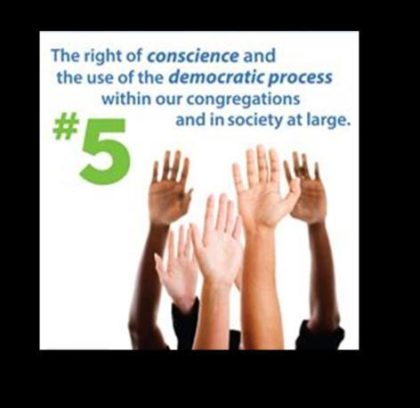 Ethics and democracy. One doesn’t hear these two words uttered in the same sentence often. In recent times, one hears democracy combined with other philosophies like capitalism, federalism, consumerism, and utilitarianism. We daily hear discussions of liberalism, conservatism, progressivism, and libertarianism in the context of American democracy. And a sad reality is that nativism, racism, populism, and militarism frequently find themselves closely affiliated with democracy.
Ethics and democracy. One doesn’t hear these two words uttered in the same sentence often. In recent times, one hears democracy combined with other philosophies like capitalism, federalism, consumerism, and utilitarianism. We daily hear discussions of liberalism, conservatism, progressivism, and libertarianism in the context of American democracy. And a sad reality is that nativism, racism, populism, and militarism frequently find themselves closely affiliated with democracy.But great thinkers since ancient Greece emphasized the essential bond between democracy and ethics. Hegel wrote that a democratic state “does not rest on a still unreflecting, undeveloped confidence, but implies laws, with the consciousness of their being founded on an equitable and moral basis, and the recognition of these laws as positive.” Montesquieu wrote,
Virtue in a republic is a most simple thing: it is a love of the republic; it is a sensation, and not a consequence of acquired knowledge: a sensation that may be felt by the meanest as well as by the highest person in the state. When the common people adopt good maxims, they adhere to them more steadily than those whom we call gentlemen. It is very rarely that corruption commences with the former: nay, they frequently derive from their imperfect light a stronger attachment to the established laws and customs.
And in a 2008 speech, Bill Moyers said, “Here is the crisis of the times as I see it: We talk about problems, issues, policies, but we don’t talk about what democracy means — what it bestows on us — the revolutionary idea that it isn’t just about the means of
governance but the means of dignifying people so they become fully free to claim their moral and political agency.”
The shroud of hopelessness blanketing our nation today comes not simply from a lack of jobs, housing, fair wages, or equality. Hopelessness stems directly from the grossly unethical behavior of those entrusted to lead our nation. When our leaders exhibit no compassion for the poor, for the Dreamers, for the victims of police brutality, for survivors of sexual assault, domestic violence, and human trafficking, for the families of fallen soldiers, and so many others, then the seeds of hope produced by the fruit of democracy falls onto barren soil. As Unitarian Universalists, we have a duty to defend democracy from these heartless clods.
Spirits of Life and Love, reveal your strength to us in this time of challenge.
Walls represent powerful real and symbolic forces in our lives. We need courage to resist unjust walls and repair the walls of support when we need.
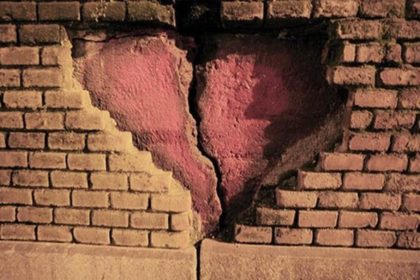 So when a politician tells you that our nation needs a wall along its southern border, tell them that Americans need affordable health care more. When someone calls for a wall against all immigration, tell them that we need a executive ban on xenophobia. When someone demands more prison walls, tell them we need a less racist criminal justice system. When so-called pro-lifers call on us to tear down the walls of Planned Parenthood, call them out on their hypocrisy and misogyny. And when our crumbling infrastructure once again fails to elicit action from Congress, tell the rich and powerful to free the people from oppression so we may repair the breaches in our bridges and roads, our dams and levees, our schools and hospitals, and in the moral fiber sewn into the tapestry of our democracy.
So when a politician tells you that our nation needs a wall along its southern border, tell them that Americans need affordable health care more. When someone calls for a wall against all immigration, tell them that we need a executive ban on xenophobia. When someone demands more prison walls, tell them we need a less racist criminal justice system. When so-called pro-lifers call on us to tear down the walls of Planned Parenthood, call them out on their hypocrisy and misogyny. And when our crumbling infrastructure once again fails to elicit action from Congress, tell the rich and powerful to free the people from oppression so we may repair the breaches in our bridges and roads, our dams and levees, our schools and hospitals, and in the moral fiber sewn into the tapestry of our democracy.Amen, Blessed Be, and Let it be so.
Nehemiah, Chapter 6
When word reached our enemies, they sent messages intended to intimidate and threaten me. They cited rumors about me, and I replied that these were figments of your imagination. A hireling pleaded that I meet him in the sanctuary of the House of God to prevent my murder. But I realized he only sought a scandal by which to reproach me.
“The wall was finished after 52 days. When our enemies heard it, all the nations round us were intimidated, and fell very low in their own estimation; they realized that this work had been accomplished by the help of our God.”
